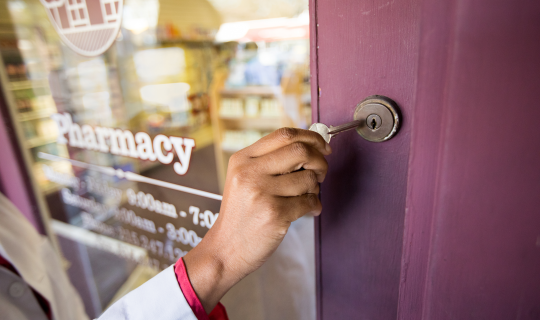Tips for Buying an Independent Pharmacy
By Charlie Le Bon

While being a small-business owner may be empowering and rewarding, it also comes with a heavy dose of responsibility. Some prefer to focus on the clinical side of the business without worrying about back-office operations, managerial issues or profit-and-loss statements. Yet, if you possess the drive and are able to put in the hours, owning an independent pharmacy is easily within your grasp. The first steps are to find the right purchase opportunity and to figure out how to value and structure the deal.
Keys to the right deal: location, volume and due diligence
Once you decide to buy an independent pharmacy, the first step is picking a location. Because owning and operating your own pharmacy is typically a long-term proposition, you need to ask yourself: “Where do I want to be for the next 10 or 20 years of my life? Where do I want to raise a family? What type of community do I want to dedicate myself to?”After defining the geographical search parameters, the next step is to determine what you can afford. You can use a store’s volume for flexibility in affordability, as a store’s volume directly correlates with its price. For example, if you're looking for a low entry price, you can purchase a lower volume store with break-even profitability and then make their own improvements to increase patient volume and the pharmacy’s bottom line. If you're willing to pay more up front, you can look for a higher volume store that's already filling 300 to 400 scripts per day and generating healthy cash flow.
To some extent, determining whether to buy a high-volume or low-volume store may depend on your financial resources and/or ability to gain financing. It’s a good idea to go through a pre-approval process with your lender to figure out how much of a loan you can obtain. Doing this legwork up front will enable you to focus your search on pharmacies that are in your price range. This early due diligence work with a lender shows sellers that you're a serious and motivated buyer. Sellers want to work with a buyer who can execute a transaction.
While a high-volume pharmacy might be on the market for more than you're able to afford, there are plenty of lower-volume pharmacies with significantly lower entry costs. According to the 2016 NCPA digest, almost half of community pharmacies have less than $2.4 million in gross annual sales,1 which often means they're at the break-even point in terms of generating profit. Such a low-volume pharmacy might sell at a fraction of what a high-volume store would garner, so there are certainly opportunities for buyers who don't have the credit or collateral necessary to secure a large loan.
It’s also important to remember that a higher volume store also requires you to spend far more money on overhead, including staff, inventory and operations.
Once you've identified a pharmacy that checks all the right boxes (right location, ideal volume and affordable), it’s essential to perform thorough due diligence before any finalizing any deals. Just as a smart home buyer would hire a professional inspector to evaluate a home, you should have a certified public accountant (CPA) review the pharmacy’s records before making a purchase decision. The CPA can scrutinize tax returns, assess profit margins, analyze the seller’s discretionary expenses and check the profit-and-loss logs from sales. While any good CPA should be able to perform an adequate assessment, you may wish to seek the opinions of a CPA from a firm that specializes in pharmacy accounting.
Closing the deal
Buying a pharmacy is a complex process. You may have deep clinical expertise, but chances are you're not as well-versed in accounting, law, mergers and acquisitions. That’s why it’s critical to surround yourself with a competent, trusted team of experts and advisors when purchasing a pharmacy. This team could include an accountant and an attorney, as well as a pharmacy ownership advisor.
Keep in mind that the majority of independent pharmacy owners are over the age of 50,2 and a significant percentage of these owners will likely retire and sell their pharmacies in the next five to 10 years. So, there will be plenty of opportunities hitting the market
That said, at the moment, buyers far outnumber sellers by a 2-to-1 ratio. This high demand means that you should expect to have competition for desirable pharmacies as soon as they become available.
While strong demand may lead to quick sales, it's not necessarily driving up prices in the independent pharmacy market. Most buyers depend on bank loans to close the deal, and lenders make their decisions on how much credit to extend based on mathematical calculations involving sales volume, revenue and profits. Accordingly, even a reckless buyer would presumably not be able to offer $1 million for a low-volume pharmacy with negligible profits because the bank would refuse to authorize a loan that wasn't justified by the pharmacy’s financial performance.
With patience and persistence, you can eventually succeed in negotiating and finalizing a deal that makes sense for you—the right pharmacy in the right location at the right price. Once the deal is done, it’s time to take a deep breath and spend 60 to 90 days analyzing operations before making any major decisions.
This is the time for you to observe the pharmacy’s operations on a day-to-day basis to see what works well and where there may be room for improvement. This review period also gives you an opportunity to evaluate key employees to determine which ones will be a good fit for your personality and strategic goals.
Ultimately, it's important to remember that you can chart your own course, differentiating your business through superior customer service or by focusing on niche markets like compounding, home medical equipment or medication therapy management (MTM).
Of course, one of the biggest benefits for independent pharmacy owners is long-term investment as the value of the business appreciates. But, venturing down the path of ownership has rewards that are beyond quantitative: being your own boss or having something to pass down through generations.
2. Ulkens, C. (2003, Nov. 17). NCPA seeks new independent pharmacy owners. Recovered 2018, Feb. 13 from http://drugtopics.modernmedicine.com/drug-topics/content/ncpa-seeks-new-independent-pharmacy-owners?trendmd-shared=0






